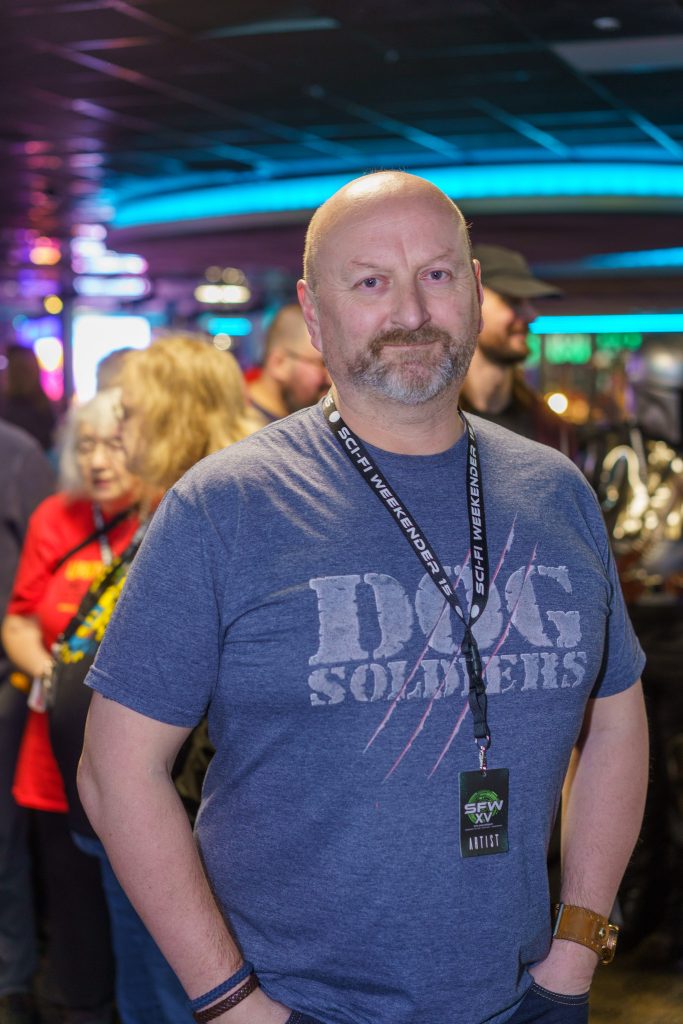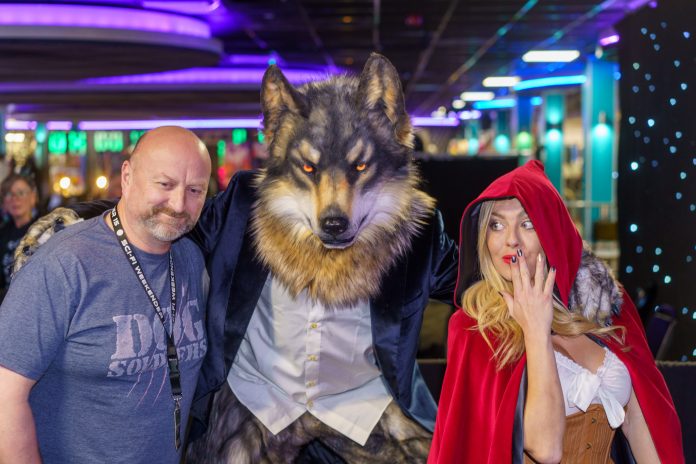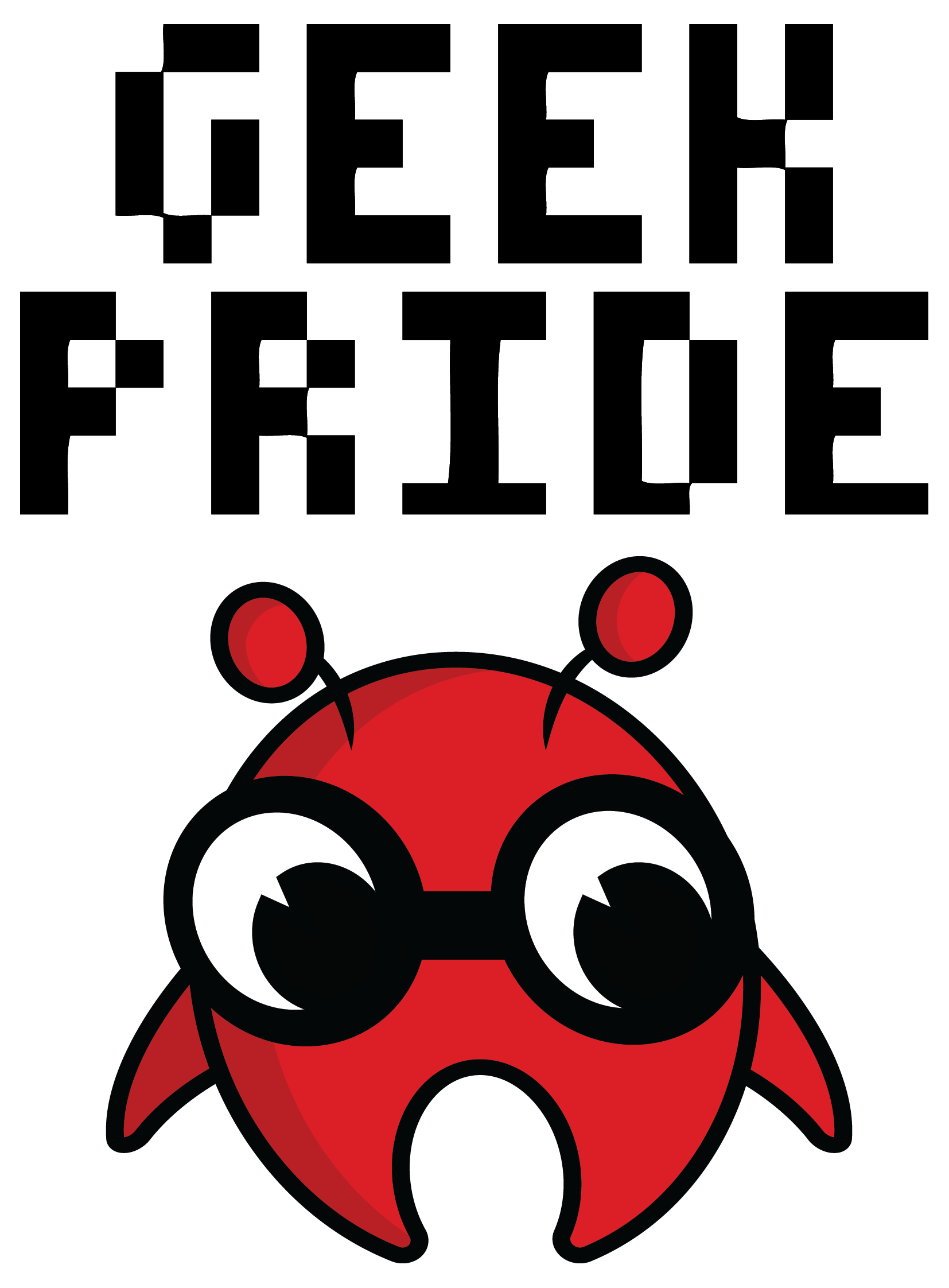“My mum and my sisters are very strong women, and I have grown up with that. It doesn’t have to be about women being stronger than the men, but certainly just as strong and as capable.”
Thus filmmaker Neil Marshall explains the inclusion of capable women in all his films. He continues the tradition of the characters of Ellen Ripley in Alien and Sarah Conner in The Terminator, which were clear influences on Marshall during his formative years
Neil Marshall is one of those few people who does almost everything in the world of film. He has written, directed, edited and produced. He is best known for creating Dog Soldiers, The Descent, Doomsday and Centurion, Marshall has also directed episodes of Game of Thrones, Lost in Space and Constantine.
At the recent Sci-Fi Weekender (reviewed here), after a live-showing of Doomsday and Q&A, Neil Marshall sat down with Peter Ray Allison to discuss how he first became a filmmaker and why CGI will never completely supersede practical-effects.
What’s was it like growing up in the North East and wanting to be a director?
It seemed impossible. I mean, I’d got into movies as much as anybody. I liked watching movies and going to the cinema. I saw Star Wars when I was seven at the Odeon in Newcastle, and that really turned into going to the cinema and seeing movies there. At that particular time, in the late 70s with Star Wars, A Bridge Too Far and all these films I got to see, I fell in love with going into the cinema. Then, Raiders of the Lost Ark came along.
It was seeing Raiders of the Lost Ark and watching The Making of Raiders of the Lost Ark on television, that made the connection, but it was a dream. I’d started making these movies with my mates and London seemed a long way off, let alone frickin’ Hollywood.
There was a small TV industry in the Northeast at the time, so it was increments. It wasn’t like, I suddenly thought I’m going to be a Hollywood film director. I just wanted to make anything at that point. It was little things, a little TV drama here, a little something for Tyne Tees, and that led to seeing other people around that time who were making first features, or trying to do it on shoestring budgets. I was inspired by watching other directors having entered the industry by doing a low budget horror film first – like Sam Raimi and Peter Jackson. They were all making their mark in the industry, but they’d started on tiny budget horror movies. That gave me inspiration, and it was like following that path.
Was there a small community of filmmakers in the northeast?
There was a little bunch of us who came out of film school around the same time. And they’re all friends of mine. Bharat Nalluri and Richard Jones came to my degree show screening and saw the comedy-zombie movie that I’d made as my graduation film. They offered me my first job off the back of that; editing some stuff for them. They were dreaming of making their own first feature, and from my point of view, they were way ahead of me.
They were offering the editing work and storyboarding work and ultimately asked me and two other college graduates. The three of us wrote this feature film that they were going to make, which became Killing Time. Everybody who was in that little group in the region all mucked in and did this for nothing, just to do a feature.
Did it become a showcase for everyone’s talents?
It was, in a way. I edited, co-wrote and storyboarded it. I also did the action coordinating and directed part of it, because Bharat passed out through exhaustion, so I had to step in.
Everything that could go wrong on a film set went wrong. Nobody got killed, but people were injured and people got assaulted. We’re working at three o’clock in the morning and send out these young girls who are our runners to get pizza for the crew. They were mugged. Those were rough times. A riot broke out in one of our locations and we had to evacuate the set while the police arrived, because all these local kids showed up and tried to nick our gear. We stopped them, but they started throwing rocks at us and we had to get out of there. Our armourer had his car broken into, but the only thing they stole was the radio. But because he was the armourer, and his car got broken into, there was a special number that he calls. I’ve never seen so many police in my life; we had helicopters and everything. But we got the film made, by hook or by crook.
I thought we could do this better, where people get paid. That was the beginning of Dog Soldiers. Little did I know it was going to take another six years to get it made, but that was the origins of making it.
There is something uniquely British about Dog Soldiers, even down to the marketing campaign.
That was my idea, which I pitched to Pathé. For the past ten years at the cinema, they had these adverts for Territorial Army and I pitched doing teaser trailers for Dog Soldiers using that same format. They came up with the which one’s gonna break first and they only played in the UK, but they were fun to do.
Pathé then had this awesome other trailer when it got awards recognition. When we had some good reviews, they put them in the trailer. We still had voiceover man in those days, which was fun.
I just wanted to make a British movie with British humour and British characters.
One thing Dog Soldiers does very well is portray squaddies accurately.
I find not many films reflect squaddies accurately. One of the things I wanted to is make a squaddie film for the squaddies. If anybody else likes it fine, but as long as the squaddies like it, I’ll be proud. I want to make them happy because they get depicted like shit on film.
28 Days Later is a great movie, but its portrayal of the squaddies is fucking awful. After only 28 days, they’ve become psychotic rapists. I don’t buy that for a second. I wanted to do something right by the troops. My dad and my granddad were in the army, and had I not been in the film business I might well have ended up in the army as well – it was a family thing. I never met my grandad, as he died before I was born, but my dad always regaled me with his stories of the military and the humour.
Hadrian’s Wall crops up a lot in your films.
The wall thing became a bit of a trilogy, because of Doomsday which featured the wall, as well as Centurion, and then I did an episode of Game of Thrones that had the wall in as well. Having grown up in the shadow of Hadrian’s Wall, and knowing it so well, it just subconsciously came through. The Romans built a big wall because something was up there that scared them and that just fired my imagination. Obviously, we’re doing it a little bit different. With Centurion, it was all about what was up there that scared the Romans so much.
Somebody told me in a pub one day about the 19th legion; how it marched into the mists of Scotland and vanished without a trace. I had to make a film of that. I also wanted to make analogy of what was going on in Afghanistan and Iraq at the time, and about invading armies, but flip the story and tell a story from the invading point of view for once and had the villains be sympathetic. It played off the Picts as being the savages. When you hear Olga Kurylenko’s character; she’s a killer. But when you hear her story, you don’t blame her. I don’t blame her for that.
That’s always what makes stories interesting when there’s a lot of grey areas, in war particularly. We’re so used to World War Two, where everything was very black and white. There’s not so many grey areas there. In a lot of other wars, there are freedom fighters, but when does a freedom fighter become a terrorist? I was seeing what was happening overseas with the army, but this has been going on since time immemorial.
Did the creators bring you into Constantine because of being from where the character was born?
I pointed out I was from Newcastle, but we ended up shooting it over here. Trying to capture Newcastle in Atlanta was not easy. Part of the problem with that one was is that it was a network TV show and the character is not a network TV character. Constantine smokes, drinks and swears, but we had to get rid of all of that. We were hamstrung, trying to do, with our hands tied behind our back, a really cool version of the character that can’t drink, swear or smoke.
Constantine is a character defined by his flaws; of drinking, swearing and smoking.
It all comes into his story. He gets cancer and he does pay for his actions, but we couldn’t do anything. We asked if he could exhale a cigarette or be seen with a cigarette in his hand? Nothing. I always felt that as much as we did the best we could, and that Matt Ryan was a great version of the character, other networks basically stole the character and put them in Legends of Tomorrow and stuff like that instead, where he could be a bit more like the Constantine that we know and love.
Constantine should have been a streaming show, where we could have had all the drinking or smoking or swearing constantly.
You have talked in the past about a zombie movie on an oil rig – I would love to see that.
That was the feature version of my student film. It was called Outpost and I wrote the script. When I was asked after Dog Soldiers, just what else I had to make, I presented that script to sell it to Orion Films, who were wanting to make a movie with me. They read it and absolutely loved it, but it was too expensive. We sat down together and came up with The Descent.
You write, direct, edit and produce films, but how would you describe yourself?
Just a filmmaker. I don’t know that I would I call myself an auteur. As I’m not sure that I ever really believe in them, because I can’t do it without the production designer or the DOP. I think that auteur thing is a little bit tricky, but a filmmaker for sure.
You are now based in the UK, but what are you working on?
Back in 2022, I shot a female-led gangster movie. It’s like Scarface and that’s coming out this summer in cinemas. Last year, I shot a slasher movie, which we shot out in Malta and I’m only just finishing that now. I’ve just finished writing a World War Two alien invasion film. Everybody starts thinking of Saving Private Ryan meets Independence Day, but it’s not that at all. It’s set in a Cornish fishing village in 1940, when England is expecting to be invaded by Germany, but they get invaded by something else.

That sounds like a subversion of the stereotypical of films set in that time.
I was interested in doing a very Spielbergian family film. I’ve had to rein in the violence, but I still want it to be scary. I wanted to go for Jurassic Park levels of intensity. Scares can still be scary. Kids love being scared, it’s just not being offensive or going too far with the blood. You can still push the envelope a little bit and make it scary for them, for sure.
This has got aliens and various sequences. It’s about a bunch of kids who get evacuated from London to this village. All the men of fighting age are off during the war and what’s left in the village are the kids, the old home guard and the land girls and it’s them who have to fight off the aliens. It’s like Empire of the Sun meets Goonies meets Aliens.
Will you be using practical effects or use CGI?
I prefer practical on so many levels. It’s better for the actors and it looks better on camera. You can hack stuff with CGI, but at the end of the day if you want to create a classic monster, then do it practically. When I think of the classic monsters, they are pretty much all practical. From the original Frankenstein‘s monster to The Howling and America Werewolf in London to The Thing and the original Predator. They still look amazing because they were real. I very much believe in that.
Neil Marshall, thank you very much.
All photos are by Peter Gatehouse and are used with permission.



